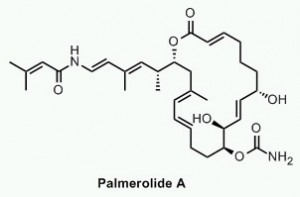 Palmerolide A is a natural substance that is today thought to provide better treatment and improve survival rates of patients suffering from melanoma. Synthesised by a team headed by professor Dennis G. Hall at the University of Alberta, Palmerolide A has been found to have exceptional potential to treat this often fatal form of skin cancer.
Palmerolide A is a natural substance that is today thought to provide better treatment and improve survival rates of patients suffering from melanoma. Synthesised by a team headed by professor Dennis G. Hall at the University of Alberta, Palmerolide A has been found to have exceptional potential to treat this often fatal form of skin cancer.
Melanoma is a rare and aggressive form of skin cancers that so far doesn’t have an effective approach to chemotherapy. According to Professor Hall, less than a quarter of patients respond to chemotherapy for skin cancer that works for less than a year and often show very poor survival rates. Moreover, most cancer drugs lack selectivity for cancer cells versus normal cells, adding to the agony of treatment.
Palmerolide A has shown very promising results in its selectivity for melanoma cell lines, thereby solving the issue of selectivity and offering a new ray of hope in skin cancer treatment.
Commercial availability of drug based Palmerolide A is still underway. Many steps need to be completed before the drug can be marketed, one of them being, making the drug more water soluble while retaining its potency.
Professor Hall and his team are amongst the strong contenders along with others like the University of St. Andrews in Scotland, in the race to develop a potential treatment for melanoma.
About Palmerolide A
The Palmerolides are a family of cytotoxic marine macrolides isolated from the rare type of sea squirt, which can only be found in the shallow waters around the Anvers Island on the Antarctic Peninsula. Palmerolide A in particular was found to have increased selectivity for melanoma cell lines and is therefore being explored for a possible treatment for this cancer.
Extracting Palmerolide A from these rare sea squirts for mass production of the drug is not a viable option and therefore scientists such as Hall are trying to synthesise this compound artificially.
